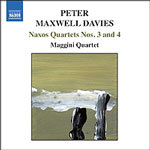
Naxos Quartets Nos. 3 and 4
 $25.00
Out of Stock
$25.00
Out of Stock6+ weeks add to cart
PETER MAXWELL DAVIES
Naxos Quartets Nos. 3 and 4
Maggini Quartet
[ Naxos / CD ]
Release Date: Tuesday 14 June 2005
This item is currently out of stock. It may take 6 or more weeks to obtain from when you place your order as this is a specialist product.
"A brisk, well-sung performance of Haydn's late choral masterpiece"
Editor's Choice Gramophone Magazine (June 2005)
MUSICWEB RECORDINGS OF THE YEAR (2005)
"Good to see this major cycle continuing. Volume 1 was chosen as a Recording of the Month for October last year; its successor lives up to the first volume's promise and once again the excellent Maggini Quartet bring their impressive qualities of youth, technical excellence and intellectual grasp to bear on these sometimes complex scores.
Although the Third Quartet was initially intended as an exercise in what the composer himself refers to as a 'concentrated attempt at virtuoso composition', external events intervened and changed the quartet's course. The event in question was the invasion of Iraq; the use of the title, 'March' is apposite for the first movement, then. Maxwell Davies' own note is interesting in that he refers to the 'short exposition' being 'in C minor', and there are indeed hints of tonal constructs, although without the supporting armoury of tonal directional movement. A coda brings sudden stasis after the march is developed (transformed) into a march of 'a fatuous and splintered nature' (Maxweell Davies). The whole is delivered with supreme confidence by the Magginis.
The second movement is subtitled, 'In Nomine' and is the gripping emotional centre of the work (it lasts 11'42). Using techniques drawn from Renaissance polyphony and indeed the 'In Nomine' melody itself (although it is not heard initially), it also takes up an argument directly from the close of the first quartet. Such inter-work relationships are one of the privileges a composer can allow himself when working on such an extended canvas as a pre-agreed cycle of quartets, so that works can reach across time t o 'speak' with others, or indeed, to 'bleed' into them. As one listens, it becomes obvious that this is ultra-carefully constructed music that will repay many, many revisits.
The elusive and disjunct third movement ('Four Inventions and a Hymn') works particularly well here, perhaps because the immediate recording gives it that extra bit of presence. The Hymn happens near the end (5'20 into a movement that lasts 6'19), and emerges as though through the aural equivalent of a distorting fairground mirror!. Finally there comes a fugal finale. This movement plays with fugue in the traditional sense and the actual meaning of the word 'Fuga' ('flight'). The idea of various strata interacting interests me personally as a listener. It is fascinating that, as Maxwell Davies interrupts the slow fugue proper, one can imagine the fugue continuing while the busy foreground is taking up our consciousness; so that when we hear the fugue again, it is more that we 'rejoin' it further along its path. Virtuoso composition given a virtuoso performance in excellent sound.
The Fourth Quartet is subtitled 'Children's Games'. Reporting on its London premiere, I suggested that 'there is much to be discovered at subsequent hearings' and this disc indeed gives us the opportunity to get to know this score better. Here, in a single movement, Maxwell Davies seems intent on playing with perspective. The work is a response to Breughel's 1560 painting of children playing; why could this not be reproduced on the cover of the disc?). Just as the painter plays with our vision, Maxwell Davies plays with our hearing, leading us down various pathways that may or may not be cul-de-sacs. The journey Max takes us on poses huge challenges for the performers (good job both violinists are so happy way up in the stratosphere), but also for the listener. Maxwell Davies' imagination is simply remarkable.
The Maggini Quartet seems to want to emphasise the beauty inherent in this work, and there are many passages that make one hold one's breath.
An important release."
-- Colin Clarke, MusicWeb International, April 2005
Writing for string quartet has forced Max to simplify his language; these latest essays in the genre, commissioned by the Naxos record label as part of a series of 10, are even more elegiac and economically impressive than the first two. . . . The Magginis remain impressive advocates of Max's late-flowering muse.
-- Andrew Clark, The Financial Times, 19 April 2005
Davies initially intended his third Naxos Quartet, written in the spring of 2003, to be a work of formidable organisational complexity. . . . The invasion of Iraq took it in a different direction. The result is a powerful piece, conveying desolation and a sense of frustration. . . . The Maggini Quartet play both works with finesse.
-- Stephen Pettitt, The Sunday Times, 19 April 2005
Both works are based upon Davies's now familiar range of technical devices—the magic squares, transformations of plainsong fragments and carefully plotted harmonic progressions—but they also graft on further musical references and carry layers of extra-musical allusion. No. 3, with its minatory opening march, deliberately grotesque scherzo and bleak finale, is Davies's response to the invasion of Iraq, while the single-movement Fourth was designed to be much lighter an less aggressive than its predecessor, with Breughel's painting of children's games as its direct inspiration.
-- Andrew Clements, The Guardian, ****(four stars), 19 April 2005
Tracks:
Naxos Quartet No. 3
Naxos Quartet No. 4, "Children's Games" (Moderato)


